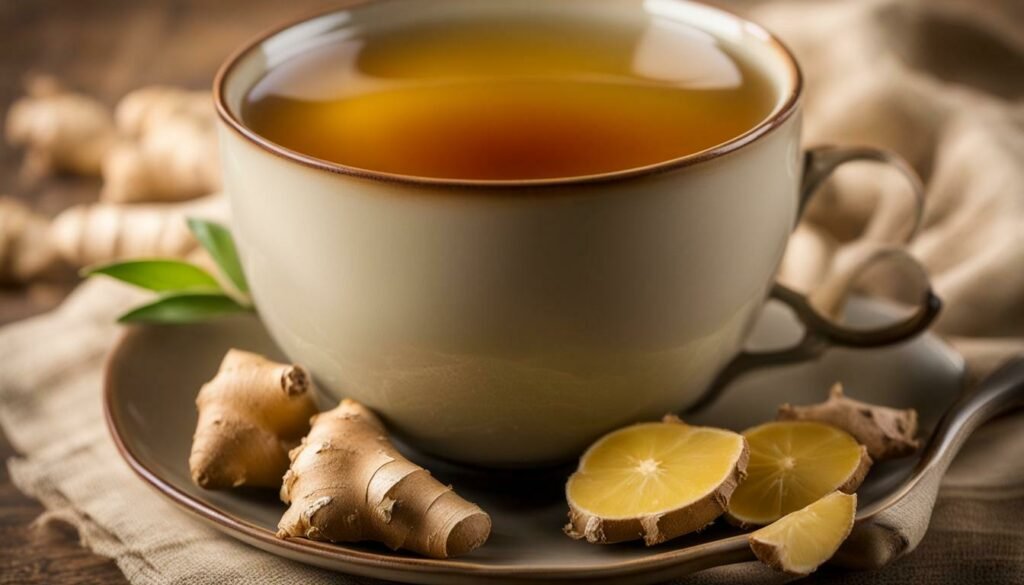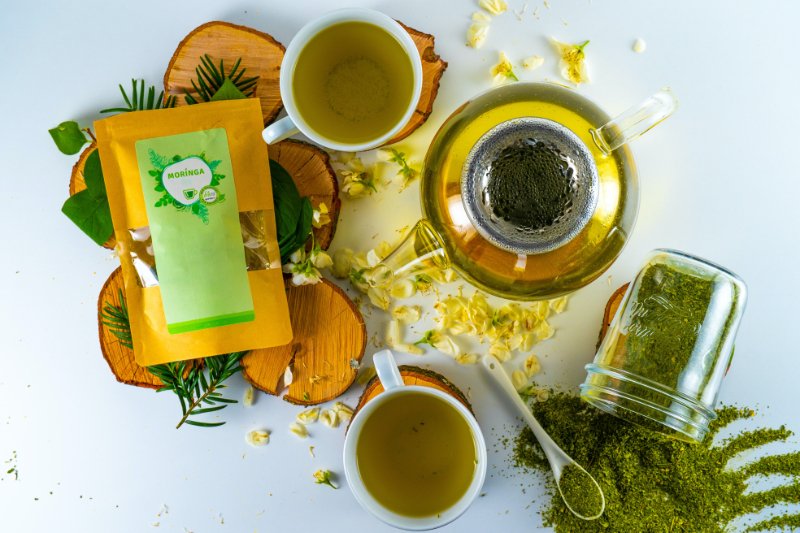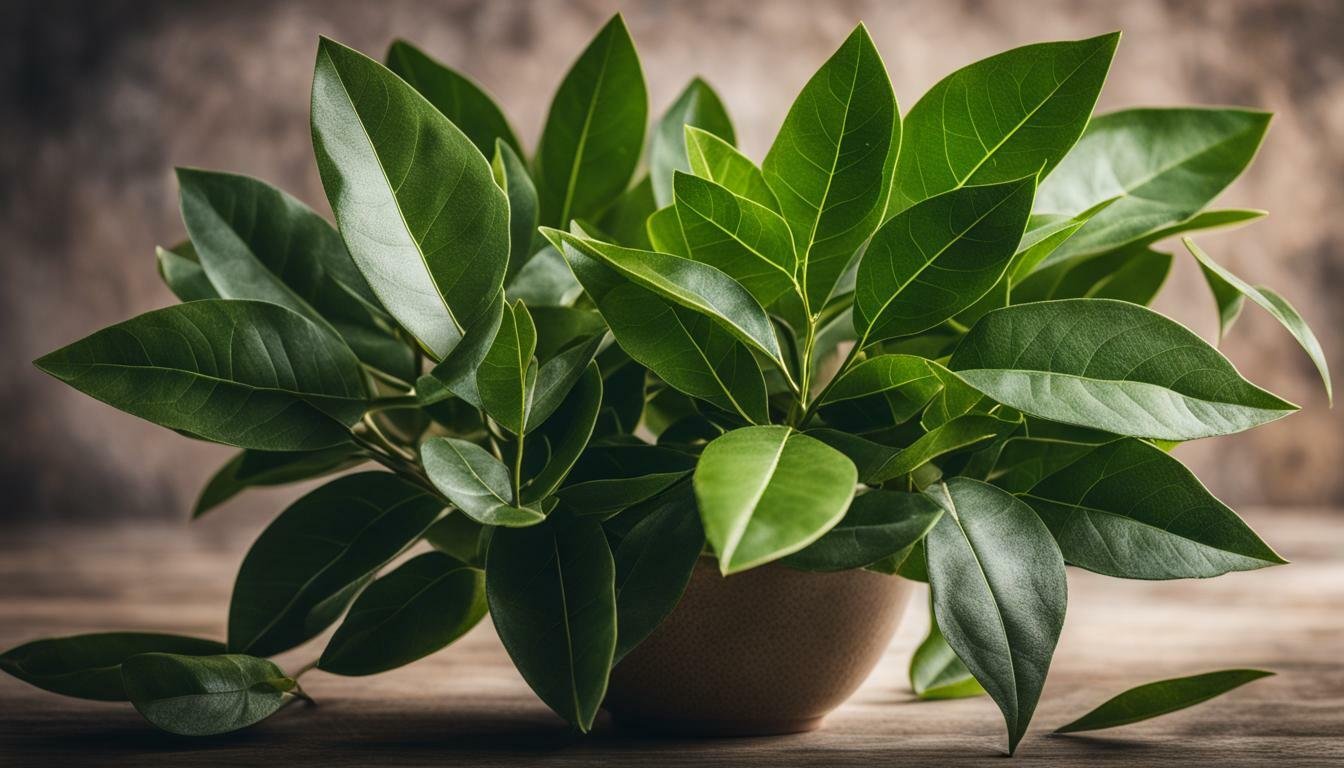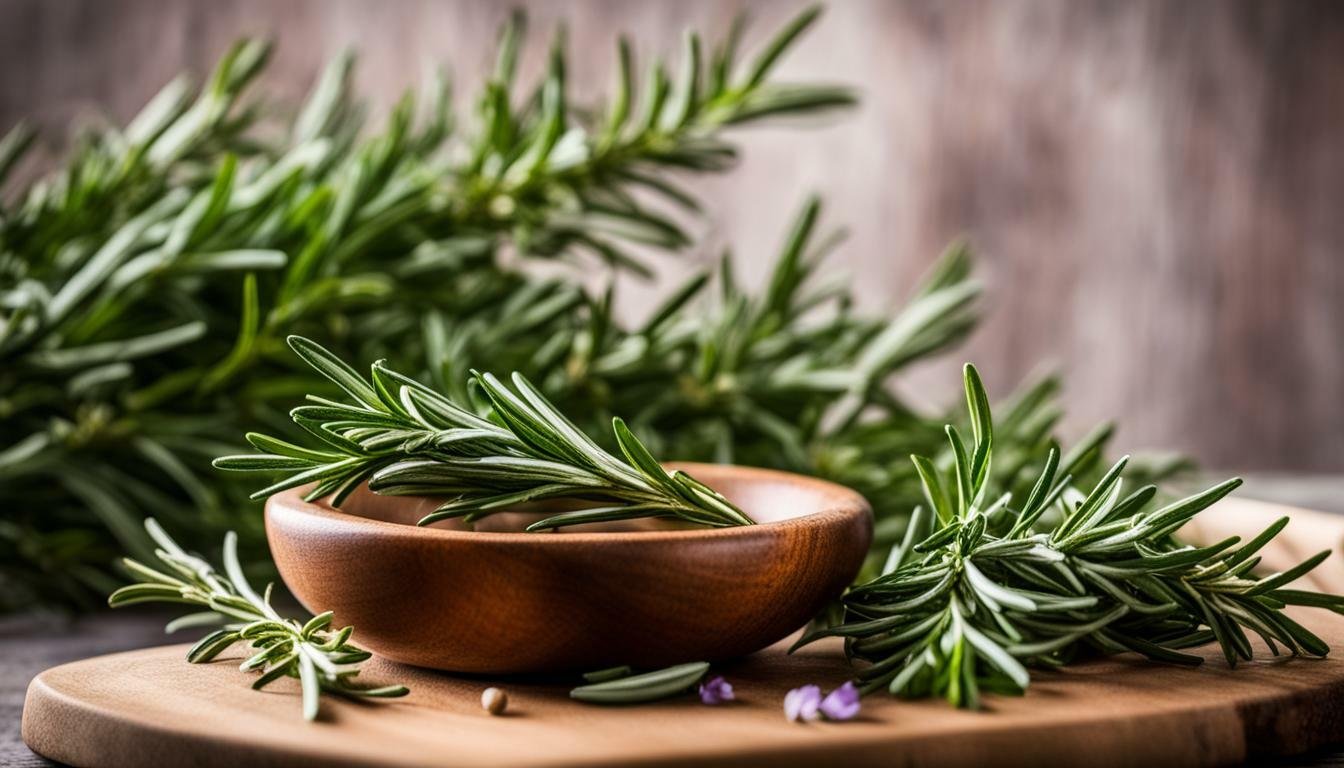Top Herbs for Fever Reduction and Wellness
Discover the power of herbs for fever relief and overall wellness with these natural remedies. When it comes to finding relief from fever, many people turn to traditional herbal remedies that have been used for centuries. These herbs offer a holistic approach to wellness, harnessing the power of nature to promote natural healing and boost the immune system.
- Ginger has anti-inflammatory and analgesic properties that can reduce symptoms of viral fever.
- Coriander seeds boost the immune system and treat viral infections.
- Tulsi leaves have antibacterial properties and can relieve fever, headache, cold, cough, and flu.
- Garlic is effective in treating viral fever and can be added to warm water or soup.
- Rice water detoxifies the system and helps treat viral fever.
By incorporating these herbs into your diet and lifestyle, you can experience natural relief from fever and enhance your overall wellness. It’s important to remember that while these herbs can be effective, it’s always a good idea to consult with a healthcare professional if your fever persists or worsens.
Ginger for Fever Reduction
Ginger, known for its anti-inflammatory and analgesic properties, is a powerful herb that can help reduce symptoms of viral fever. Its natural compounds have been used for centuries to relieve pain, reduce inflammation, and promote overall wellness.
To harness the benefits of ginger for fever relief, you can easily prepare a soothing tea. Begin by grating fresh ginger and adding it to boiling water. Let it simmer for a few minutes before straining the liquid. For added sweetness and additional health benefits, mix in a teaspoon of honey. Sip on this ginger tea twice a day to alleviate fever symptoms.
Alongside its fever-reducing properties, ginger is also known to aid in reducing cough and respiratory discomfort. Incorporating ginger into your wellness routine can provide natural relief and help you on your path to recovery.
| Benefits of Ginger for Fever Reduction |
|---|
| Anti-inflammatory properties |
| Analgesic effects |
| Fever relief |
| Respiratory support |
Coriander Seeds to Boost Immunity
Coriander seeds, rich in essential plant phytonutrients, are an excellent natural remedy to boost your immune system and fight off viral infections. These small, round seeds are packed with antioxidants and have been used for centuries to promote overall health and well-being.
When it comes to treating viral infections, coriander seeds can be prepared in a variety of ways to enhance their immune-boosting properties. One popular method is to create a concoction by steeping coriander seeds in water. Simply take a handful of coriander seeds and add them to boiling water. Let the mixture simmer for a few minutes, strain it, and enjoy the liquid as a soothing tea.
Alternatively, you can also opt to steep coriander seeds in water overnight. This allows the seeds to release their beneficial compounds into the water, resulting in a potent immune-boosting concoction. It’s important to note that while coriander seeds can be a helpful addition to your immune-boosting routine, they should not be relied upon as a sole treatment for viral infections. If you experience persistent symptoms or your condition worsens, it’s always best to consult a healthcare professional.
| Benefits of Coriander Seeds | How to Use Coriander Seeds |
|---|---|
| Boosts immune system | Steep in water to create a concoction |
| Contains antioxidants | Add to boiling water and enjoy as a tea |
| Promotes overall health and well-being | Strain and drink the liquid |
Steeping Coriander Seeds for Maximum Benefits
If you want to maximize the immune-boosting benefits of coriander seeds, you can follow these steps:
- Take a handful of coriander seeds and rinse them thoroughly.
- In a saucepan, bring water to a boil.
- Add the rinsed coriander seeds to the boiling water.
- Reduce the heat and let the mixture simmer for about 10 minutes.
- Remove the pan from heat and allow the seeds to steep in the water for at least 30 minutes.
- Strain the mixture to separate the liquid from the seeds.
- Drink the liquid as a tea or store it in the refrigerator for later use.
By incorporating coriander seeds into your diet, you can harness the power of natural remedies to support your immune system and promote overall wellness. Remember to always consult a healthcare professional for personalized advice and guidance.
Tulsi Leaves for Fever Relief
Tulsi leaves, known for their antibacterial properties, can be a soothing relief for fever, headaches, colds, coughs, and flu. This sacred herb has been used for centuries in Ayurvedic medicine for its healing properties. The active compounds in tulsi leaves, such as eugenol and camphene, help reduce inflammation and fight off infections.
To harness the benefits of tulsi leaves for fever relief, you can easily make tulsi water at home. Simply take a handful of fresh tulsi leaves and wash them thoroughly. Boil a cup of water and add the tulsi leaves to it. Let it simmer for a few minutes, allowing the leaves to infuse their medicinal properties into the water. Strain the water and drink it warm or at room temperature.
For a more convenient option, you can also chew on fresh tulsi leaves. This not only provides relief from fever symptoms but also helps soothe sore throat and reduce congestion. Tulsi leaves can be added to teas, soups, or salads to enhance their flavor and health benefits.
It is important to note that while tulsi leaves can offer relief from fever symptoms, it is advisable to consult a healthcare professional if the fever persists or worsens. Tulsi leaves should be used as a complementary treatment alongside medical guidance for optimal results.
The Power of Tulsi Leaves for Fever Relief
Tulsi leaves have long been revered for their medicinal properties, and their effectiveness in reducing fever symptoms is well-documented. The antibacterial and anti-inflammatory properties of tulsi leaves make them a natural and safe remedy for fever relief. Incorporating tulsi leaves into your wellness routine can help alleviate discomfort while boosting your immune system.
| Tulsi Leaves for Fever Relief | Instructions |
|---|---|
| 1. Tulsi Water | – Wash a handful of tulsi leaves – Boil a cup of water and add the leaves – Simmer for a few minutes – Strain and drink warm or at room temperature |
| 2. Chewing Tulsi Leaves | – Chew on fresh tulsi leaves – Use in teas, soups, or salads for added flavor and health benefits |
By incorporating tulsi leaves into your fever management routine, you can experience relief from symptoms and promote overall wellness. Remember to maintain a balanced diet, stay hydrated, and get plenty of rest to support your body’s natural healing process.
Garlic, with its potent antibacterial properties, is an effective natural remedy for treating viral fever. This humble herb has been used for centuries to combat various illnesses, thanks to its active compound called allicin. Allicin is known for its powerful antimicrobial and antiviral effects, making garlic a go-to herb for boosting the immune system and fighting off infections.
To reap the benefits of garlic for fever relief, there are several ways you can incorporate it into your daily routine. One popular method is to crush a few garlic pods and add them to warm water or soup. The heat helps release the active compounds in garlic, allowing them to work their magic in reducing fever and alleviating other flu-like symptoms.
Another way to consume garlic is by including it in your meals. Whether it’s adding minced garlic to your stir-fries, roasting whole garlic cloves with vegetables, or blending garlic into salad dressings, the options are endless. Not only will you be enhancing the flavor of your dishes, but you’ll also be harnessing the medicinal properties of this remarkable herb.
| Benefits of Garlic for Treating Viral Fever |
|---|
| Powerful antibacterial properties |
| Antiviral effects against various strains of viruses |
| Boosts the immune system |
| Reduces fever and flu-like symptoms |
“Garlic has been used for centuries as a natural remedy for various ailments, including viral fever. Its antibacterial properties make it a valuable asset in fighting off infections and promoting overall wellness.”
While garlic is generally safe for consumption, it’s important to note that some individuals may experience digestive discomfort or an allergic reaction to garlic. If you’re unsure about incorporating garlic into your routine, it’s always a good idea to consult with a healthcare professional.
Rice water, known for its detoxifying properties, can play a crucial role in treating viral fever. This natural remedy has been used for centuries in many cultures to alleviate fever symptoms and promote overall wellness. The process of boiling rice creates a potent liquid that is rich in nutrients and can help flush out toxins from the body.
To prepare rice water, simply rinse a cup of rice thoroughly and soak it in two cups of water for about 30 minutes. Afterward, bring the mixture to a boil and let it simmer for 15-20 minutes until the rice is cooked. Strain the rice, and the resulting liquid is your rice water.
Drinking a glass of rice water on an empty stomach can help detoxify your system and provide relief from fever symptoms. The cooling properties of rice water can help reduce inflammation and promote hydration. It is important to note that rice water should not be a substitute for medical treatment, and consulting a doctor is recommended if the fever persists or worsens.
| Benefits of Rice Water Detoxification |
|---|
| Flushes out toxins from the body |
| Reduces inflammation |
| Promotes hydration |
| Supports overall wellness |
It is important to maintain a balanced diet, consume comforting foods, and stay well-hydrated when managing a fever. Along with rice water, incorporating other natural remedies such as ginger, garlic, and tulsi leaves can further aid in fever reduction and immune boosting. Remember to listen to your body, get plenty of rest, and seek medical advice if needed.
Moringa Bark for Fever Reduction
Moringa bark, packed with vitamins, minerals, antioxidants, and antibacterial agents, is a powerful tool for reducing fever and promoting overall wellness. This natural remedy has been used for centuries to combat viral infections and strengthen the immune system. The rich nutritional content of moringa bark makes it an ideal choice for fighting fever and eliminating toxins from the body.
To harness the benefits of moringa bark, you can prepare a decoction by boiling a few pieces of bark in water. Strain the liquid and drink it twice daily to help reduce fever and boost your body’s natural defenses. The antibacterial properties of moringa bark work to combat the underlying causes of fever, while the antioxidants help to neutralize harmful free radicals.
The power of moringa bark lies in its ability to support the body’s natural healing processes and provide relief from common fever symptoms.
In addition to its fever-reducing properties, moringa bark is also known to have a detoxifying effect on the body. It helps to eliminate toxins and promote overall wellness, making it an excellent choice for maintaining a healthy immune system. Incorporating moringa bark into your daily routine can help to keep you feeling strong and resilient.
As with any herbal remedy, it is important to consult with a healthcare professional before using moringa bark for fever reduction. They can provide guidance on dosage and potential interactions with any medications you may be taking. With the right approach, moringa bark can be a valuable tool in your natural remedy toolkit.
| Benefits of Moringa Bark for Fever Reduction |
|---|
| Antibacterial properties |
| Rich in vitamins, minerals, and antioxidants |
| Detoxifies the body |
| Boosts the immune system |
The Power of Herbs for Fever Relief and Immune Boosting
Harness the power of herbs such as ginger, turmeric, garlic, oregano, and black pepper for fever reduction and immune boosting, and remember to prioritize rest and a balanced diet.
Ginger, known for its anti-inflammatory and analgesic properties, can help alleviate symptoms of viral fever. To make ginger tea, boil grated ginger in water, strain it, and add honey for added relief. Drink this tea twice a day to promote wellness and ease discomfort.
Coriander seeds are packed with essential plant phytonutrients that boost the immune system. Consuming a concoction made from coriander seeds or steeping them in water can enhance your body’s natural defenses and effectively treat viral infections.
Tulsi leaves, also known as holy basil, possess potent antibacterial properties that combat inflammation and reduce fever. Drinking tulsi water or chewing fresh tulsi leaves can provide relief from common fever symptoms, headaches, colds, coughs, and flu.
Garlic is renowned for its antibacterial properties and can be an effective remedy for viral fever. Crush garlic pods and add them to warm water or soup to reduce fever and promote overall wellness.
Rice water is an excellent detoxifying agent that aids in the treatment of viral fever. Drinking a glass of rice water on an empty stomach can help eliminate toxins from your system and support your recovery.
Moringa bark, derived from the moringa plant, is rich in vitamins, minerals, antioxidants, and antibacterial agents. It can effectively reduce fever and eliminate harmful toxins from your body, promoting a faster recovery.
In addition to the mentioned herbs, black pepper, amala, oregano, sage, lemon balm extract, fennel, liquorice root, turmeric, and rosemary are also known for their fever-reducing and immune-boosting properties. Incorporating these herbs into your diet can provide additional support and aid in your overall wellness.
When managing fever at home, it is important to maintain a balanced diet, consume comforting foods, stay hydrated, and prioritize rest. If the fever persists or worsens, it is advisable to consult a doctor for further guidance and treatment.
FAQ
How can ginger help reduce fever?
Ginger has anti-inflammatory and analgesic properties that can reduce symptoms of viral fever. You can boil grated ginger in water, strain it, and add honey to make tea. Drink this tea twice daily for relief.
How can coriander seeds boost immunity?
Coriander seeds contain essential plant phytonutrients that boost the immune system. You can drink a concoction or steep coriander seeds in water to enhance immunity and treat viral infections.
What are the benefits of Tulsi leaves for fever relief?
Tulsi leaves have antibacterial properties and can reduce inflammation. You can drink tulsi water or chew tulsi leaves to relieve fever, headache, cold, cough, and flu.
How can garlic treat viral fever?
Garlic has antibacterial properties that can help treat viral fever. You can crush garlic pods and add them to warm water or soup to reduce fever.
How does rice water help with fever reduction?
Rice water detoxifies the system and helps treat viral fever. Drinking a glass of rice water on an empty stomach can be beneficial.
What are the benefits of moringa bark for fever reduction?
A: Moringa is rich in vitamins, minerals, antioxidants, and antibacterial agents that combat viral fever. The bark of the moringa plant can reduce fever and eliminate toxins from the body.
How can black pepper and tulsi leaves fight viral fever?
Black pepper is rich in antibacterial and antibiotic properties. Boiling water with crushed black pepper and tulsi leaves can help fight viral fever.
How does amala strengthen the immune system?
Amala, rich in Vitamin C, strengthens the immune system and fights seasonal infections. Consuming amala or a concoction of amala daily can relieve viral fever.
What are the antiviral properties of oregano?
Oregano has antiviral properties that can combat viral infections. Brewing oregano tea with turmeric powder and drinking it twice daily can be beneficial.
How can sage ease fever symptoms?
A: Sage has antiviral activities and can ease fever symptoms. Drinking sage decoction can provide relief.
What are the antiviral properties of lemon balm extract?
Lemon balm extract has antiviral properties against influenza, herpes, and enterovirus. Including lemon balm in teas and seasonings can be beneficial.
How can fennel fight persistent fever and respiratory tract infections?
Fennel exhibits strong antiviral effects and can fight persistent fever and respiratory tract infections. Including fennel in your diet can help.
What are the antiviral properties of liquorice root?
Liquorice root contains antiviral properties and can combat infections and inflammations. It is effective against HIV, herpes viruses, and respiratory anomalies.
How can turmeric and ginger ward off viral infections?
Turmeric mixed with ginger can form a decoction to ward off viral infections. Turmeric has antibacterial and anti-inflammatory properties.
What are the antiviral effects of rosemary?
Rosemary has antiviral effects against herpes viruses, influenza, and Hepatitis A.
What are some widely used herbs for fever reduction and immune boosting?
Some widely used herbs for fever reduction and immune boosting include ginger, turmeric, garlic, oregano, and black pepper.
How can fever be managed at home?
Fever can be managed at home by maintaining a balanced diet, consuming comforting foods, drinking plenty of fluids, and getting adequate rest. However, if the fever persists or worsens, it is important to consult a doctor.
DISCLAIMER
The information provided on this website is for informational purposes only. The content is not intended to be a substitute for professional medical advice, diagnosis or treatment. Always seek the advice of your physician or other qualified health provider with any questions you may have regarding a medical condition. Never disregard professional medical advice or delay seeking it because of something you have read on this website. The remedies and suggestions in the articles are based on traditional or common home remedies passed down from earlier generations and are not intended to supersede or replace medical advice from a professional healthcare provider. The herbals and remedies may help reduce symptoms but should not replace regular doctor consultations or prescribed medications. Fever can have serious root sources.





